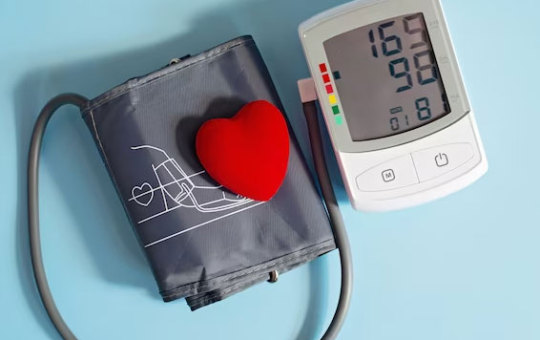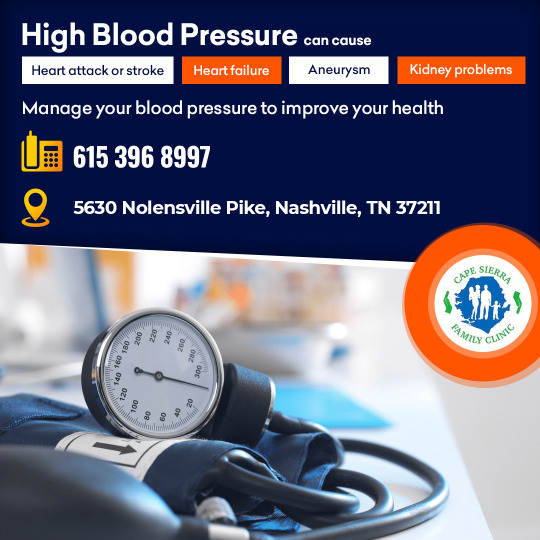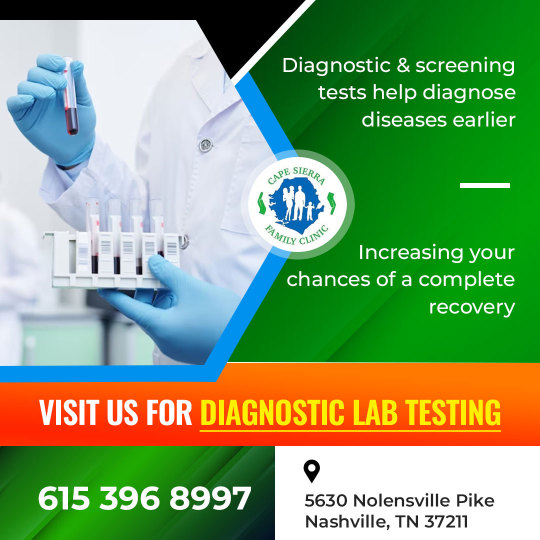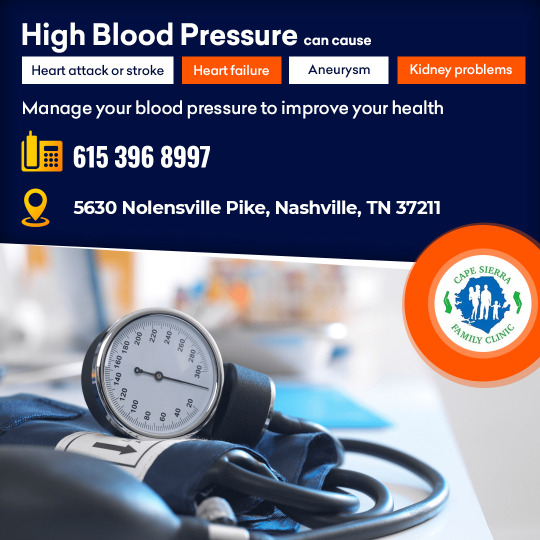Text
Walk in family clinic at Nashville
We provide comprehensive healthcare services for you and your family. Whether you need health tests for screening or diagnosis, or treat various health issues, our healthcare professionals can help. It is a family healthcare clinic that offers mandatory vaccine for children to adults.
0 notes
Text
What are the different diagnostic tests for Irritable Bowel Syndrome (IBS)?

Irritable Bowel Syndrome, or IBS, is a common disorder affecting your GI tract. You may experience bloating, gas, abdominal pain, diarrhea or constipation, or sometimes both. You can visit a family clinic in Nashville to get the necessary diagnostic tests. Since it is a chronic condition, your doctor may advise diet, lifestyle changes, and stress management. However, if you experience severe symptoms, your doctor may prescribe medications additionally to manage your condition.
Triggers of IBS
Though the exact causes of IBS are still unknown; however, various factors can contribute to it. Some factors that can trigger IBS symptoms are –
Food – Some foods, such as wheat, dairy products, beans, cabbage, carbonated drinks, etc., can trigger IBS symptoms.
Stress – IBS symptoms worsen or become more frequent for some people under increased stress. Stress can worsen your symptoms, but they are not responsible for causing IBS.
Symptoms of IBS
People with IBS may experience varied symptoms. The following are the most common symptoms that an IBS patient can experience –
Changes in frequency of bowel movement
Changes in the appearance of bowel
Bloating, cramping, and abdominal pain when passing bowel
Increased gas or mucus in stool
The sensation of incomplete evacuation of stool
Diagnostics test for IBS
If you experience persistent changes in bowel habits or your IBS symptoms, it might imply the possibility of other health concerns. Further, if you experience other severe symptoms such as rectal bleeding, anemia, unexplained vomiting, weight loss, and pain that don't get relieved despite passing gas or bowel, you should visit your healthcare providers at a medical clinic in Nashville. They might recommend the following tests for proper diagnosis.
Colonoscopy – Your healthcare provider will use a small and flexible tube to check the entire length of your colon.
CT scan – A healthcare professional will perform this test to produce images of your abdomen and pelvis to rule out the possibility of any other health concerns.
Upper endoscopy – Your healthcare provider will insert a long, flexible tube down your throat into your esophagus. The camera at the end of the tube will allow them to view your upper digestive tract. They might collect a tissue or fluid sample to check bacteria overgrowth. If doctors suspect the possibility of celiac disease, they might recommend this diagnostic test.
Laboratory tests for IBS
In addition to these procedures, your doctor may recommend the following laboratory tests. These are –
Lactose intolerance test – Lactose is an enzyme that helps digest the sugar present in dairy products. If you don’t produce lactose, you might experience symptoms similar to IBS. Hence, your provider may advise this test to diagnose whether you are lactose intolerant or have IBS.
Breath test – Your doctor may recommend a breath test to determine bacterial overgrowth in the small intestine. People with bowel surgery or diabetes, or other conditions that slow their digestion can commonly experience bacterial overgrowth.
Stool test– Your doctor may advise stool tests to examine the presence of bacteria, parasites, or bile acid.
Treatment of IBS
Your physicians might suggest various diet and lifestyle changes to help relieve your IBS symptoms. Let’s discuss them further.
If you have mild symptoms, your doctors may recommend –
Avoiding food that might trigger your symptoms
Consume fiber-rich foods
Consume plenty of fluids
Regular exercises
Get adequate restful sleep
Besides, it might be better for you, if you avoid the following foods
High-gas food – If you often experience bloating or gas, avoid carbonated and alcoholic beverages and food that might cause gas.
Gluten – Avoiding eating gluten, such as wheat, barley, rye, etc., might help improve your diarrhea symptoms
Your doctor may suggest the following medications if you experience moderate to severe symptoms.
Fiber supplements – They might help manage your constipation.
Laxatives – If fiber supplements don't provide the desired results, your doctor may prescribe laxatives to help relieve constipation.
Anti-diarrheal medication – It can help control your diarrhea symptoms.
Pain medications – TheyThey might help ease bloating or severe pain.
If you experience the symptoms commonly associated with IBS, visit your healthcare providers at a Sierra family healthcare clinic. Based on your symptoms, your doctors may recommend diagnostics tests to diagnose your condition effectively. It will help you get the proper treatment to manage your condition.
0 notes
Text
High Blood Pressure – How to manage your condition?
High blood pressure or hypertension can increase the risk of various health conditions. Often, it doesn’t cause any symptoms. However, some patients might experience moderate to severe headaches, anxiety, palpitation, feeling of pulsation in the neck, etc. Hence, you must monitor your blood pressure levels occasionally. If it consistently stays on the higher side, you must visit a family clinic in Nashville to prevent and manage blood pressure. If needed, your doctor may prescribe medications to manage your condition. This blog will share a few health tips to keep your blood pressure levels in check.

Tips to manage your blood pressure levels
The following tips can help control your blood pressure levels. Let’s discuss them further.
Physical activity
To stay healthy, one should dedicate a certain time of their entire day to various physical activities. Regular exercises have various health benefits, such as controlling high blood pressure, managing weight, reducing stress, improving heart condition, etc. In this regard, one must understand that not every exercise is suitable for everyone. Hence, you can consult your doctors to determine the right exercise.
Reduce salt consumption
Unknowingly, you may end up consuming more salt than you realize. It is better to consult your doctor to learn how much daily salt intake suits you. Besides, you may follow various steps to reduce salt consumption. It includes –
· Consuming fewer processed, prepackaged, and restaurant foods
· Read food levels and select items with 'low salt' or 'low sodium
· You can also use salt substitutes, such as herbs, spices, and other seasonings, to maintain the flavor of your food and also reducing salt intakes
Increase potassium intake
Another effective way to reduce high blood pressure is to increase potassium consumption. It also helps regulate heart rate and reduce the effects of sodium in your body. To increase potassium intake, eat appropriate foods instead of relying on supplements. It includes consuming potassium-rich foods such as bananas, oranges, melons, avocados, etc. You can also consume milk, yogurt, etc. Including sweet potatoes and leafy green vegetables in your diet can also help.
Further, add beans, nuts and seeds, and fish, such as salmon and tuna, to your diet. In addition, we advise you to consult your doctor to learn about the ideal potassium intake for you. It will help you plan your diet accordingly. Otherwise, excess potassium intake may cause you more harm than good.
Limit alcohol consumption
Excess alcohol consumption can cause increased blood pressure levels. It is better to consult your doctor to learn how much alcohol you can consume. Moreover, if you are taking medication to control your blood pressure levels, it is better to avoid alcohol consumption as it can reduce the efficiency of medications.
Reduce stress
Stress is one of the critical reasons responsible for increasing your blood pressure. Chronic stress can increase blood pressure, heart ailments, and stroke risk. Besides, if your reaction to dealing with stress involves eating unhealthy food, alcohol, or smoking, it can harm your health further.
The following tips can help manage your stress and blood pressure levels.
· Avoid triggers – Identify the factors that can trigger stress. We can understand that avoiding all stress triggers or situations is impossible. Still, try to avoid situations that might stress you out. It can be the stress of work or the thought of being late for your work. A little planning might help you avoid many stressful situations.
· Attitude of Gratitude – Acknowledging the positives and blessings in your life can help you shift your focus from the negative aspects that might cause stress. As a result, you can stay calm and avoid stress for long.
· Mindfulness – Practicing mindfulness and breathing exercise can also help you to a great extent in avoiding stress.
· ‘Me’ time – Spending a certain time of a day doing things you enjoy can also help reduce stress.
All these tips can help you manage your blood pressure levels. You should regularly monitor your blood pressure and get checkups accordingly. Monitoring blood pressure at home helps you stay aware of your health. Besides, keeping a journal with blood pressure records can also help your doctors at a medical clinic in Nashville advise you about steps to take to manage your condition. Besides, if they prescribe medications to manage your condition, you must take them as advised to keep your blood pressure in check.
0 notes
Photo

check your blood pressure
0 notes
Link
IV hydration helps the body absorb nutrients directly into the bloodstream, which keeps your body hydrated and feeling good. Learn more about the benefits of this IV hydration therapy.
0 notes
Link
Tuberculosis is primarily a disease of the lungs. Your healthcare provider may offer a skin test to diagnose TB. Know more about TB tests.
0 notes
Link
STD doesn't always cause symptoms. Undetected and untreated STDs can lead to other complications. Check out the reasons why everyone should get STD screening.
0 notes
Link
Every senior needs to practice a few caution during winter to stay healthy and safe. Visit Cape Sierra Family Clinic for proper geriatric care to stay healthy during winter.
0 notes
Link
Get to know about various tests that gets conducted by doctors. Learn more.
0 notes
Link
Vaccines have great importance for maintaining public health. They are critical to helping prevent the deadly Disease. Learn more.
0 notes
Link
Sports Physicals or Pre-Participation Exam (PPE) is not an alternative to annual physicals. Get to know about preparing for Sports Physicals to get effective results. Learn more.
1 note
·
View note
Link
Nutritional Counseling provides various health benefits for Children. Learn more.
0 notes
Link
Diabetes increases the risk of various other health complications. Learn more.
0 notes
Text
Why is Medical Diagnosis Important before Treatment?

Many diseases have similar symptoms. Hence, diagnosing your health concern based on symptoms will be wrong. As a result, medical diagnosis involves gathering a patient's medical history, physical exams, and health tests to identify the cause of their illnesses. The purpose of medical diagnosis is to understand a patient's ailments comprehensively. Hence, you should visit a diagnostics center in Nashville to get various health tests done for diagnostic purposes. An accurate and timely diagnosis improves positive health outcomes. This blog will further discuss the importance of medical diagnosis before treatment.
Effective Medical Diagnosis
With an effective medical diagnosis, your healthcare professionals can understand the causes of your health issues. It further will help them make a proper medical treatment decision accordingly. Ideally, an effective medical diagnosis should be - accurate, communicated, and timely.
Accurate - It can be difficult to diagnose health conditions properly due to the commonality of symptoms, their rareness, or other factors. Hence, your healthcare professionals will consider your medical history, perform physical exams and various tests, etc., to accurately diagnose your health concern and offer treatment. Accurate medical diagnosis is critical to providing needed treatment for complete recovery.
Communicated - For diagnosing complex health conditions, a team of medical professionals will gather relevant data in the field they are specialized. Next, the specialists will communicate their findings to understand the patient's health concern and for further medical advice. In cases such as the sudden onset of symptoms or any acute conditions, these findings can help boost the treatment's effectiveness.
Timely - Regardless of the health conditions, a timely and accurate medical diagnosis can ensure the complete recovery of patients. A combination of medical history, health tests, studies, etc., can help in a timely diagnosis.
Types of Medical diagnosis
A medical diagnosis can be of the following types. Let's discuss them further.
Clinical
Clinical diagnosis is based on the symptoms patients complain about and what medical professionals have observed. Simply put, diagnosing a health concern based on the signs and symptoms of a patient, their medical history, and different physical exams is known as a clinical diagnosis. Once your physician makes a clinical diagnosis, they may further prescribe imaging tests, blood tests, biopsies, etc., for further confirmation of the diagnosis.
Laboratory
Laboratory diagnosis is based on different cellular exams. It includes testing tissue samples, fluid samples, etc. Based on laboratory analyses, such as bacteriologic, microscopic, biopsy studies, etc., your doctor can make a laboratory diagnosis.
Radiology
Radiology diagnosis involves different imaging tests to obtain images from the inside of a patient's body. The diagnostic radiology then further assesses these images to diagnose health concerns. You may visit a family clinic Nashville to get laboratory and radiology testing done for diagnostics purposes.
Differential
Sometimes, patients might experience multiple underlying health concerns. In such instances, a medical professional might be undecided between two conditions responsible for a patient's ailments. In such cases, a differential diagnosis occurs. Your doctor may offer treatment based on the potential cause of your health concern and monitor which one is more effective. Generating differential diagnosis is a critical part of medical reasoning. It allows for further testing to rule out the possibilities and confirm the ultimate diagnosis.
Nursing
The main difference between clinical and nursing diagnosis is that while the former focuses on the physical symptoms, the latter also includes the patient's response to ongoing treatment.
Different Steps of Medical Diagnosis
Medical diagnosis usually takes place through the following 3 steps. Let’s discuss them further.
Gathering health information
At this stage, your doctor may ask you questions concerning the symptoms you are experiencing, your medical history, etc. Your physician may further suggest an observational period and perform physical exams.
Integrating Information
In this stage, your doctor will perform various laboratory and radiology tests. They will then consider your symptoms, medical history, and results from all the tests for further diagnosis. For instance, you complained about chest pain, fatigue, shortness of breath, etc., and the further test showed clogged heart valves. It will help your doctor determine the next course of treatment.
Determining the diagnosis
In this final stage, your healthcare providers will determine the diagnosis and the needed treatment. Taking a cue from the previous example, the possible causes of clogged heart valves can be an increase in cholesterol, blood pressure, or other heart condition. Identifying the actual cause will help your doctor plan treatment accordingly.
Medical Diagnosis for Positive health outcome
Many medical symptoms are non-specific. Patients used these symptoms to describe their health condition, such as chest pain, headaches, sore joints, etc. Different medical conditions might have similar symptoms. Your medical professional will chart a list of your symptoms and prescribe other health tests. Comparing test results and symptoms will help them make an accurate medical diagnosis. The more accurate the diagnosis is, the higher the chances of patient recovery. Otherwise, a late or inaccurate diagnosis can further cause health complications. Hence, medical diagnosis is crucial for better health outcomes. If you experience certain persistent physical symptoms, visit your doctor at a medical clinic in Nashville for proper diagnosis and further medical advice.
0 notes


